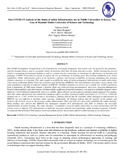Please use this identifier to cite or link to this item:
http://ir-library.mmust.ac.ke:8080/xmlui/handle/123456789/2328| Title: | Post COVID-19 Analysis of the Status of online Infrastructure use by Public Universities in Kenya: The Case of Masinde Muliro University of Science and Technology |
| Other Titles: | The Case of Masinde Muliro University of Science and Technology |
| Authors: | Wangila, Erick Shiundu, John O. Simiyu, Aggrey Mukasa |
| Keywords: | Post COVID-19 Analysis of the Status of online Infrastructure use by Public Universities in Kenya:The Case of Masinde Muliro University of Science and Technology |
| Issue Date: | 29-Jul-2023 |
| Publisher: | AFRICAN JOURNAL OF EMPIRICAL RESEARCH |
| Abstract: | The COVID-19 pandemic brought about a lot of interference in learning institutions. Universities were not spared by this pandemic, and this brought about a need to reconsider modes of learning which had all along been face-to-face. Online learning has proved itself as a promising instructional medium as well as a prime area for researchers to investigate its effectiveness on learning and pedagogy. COVID-19 provided an avenue to explore the use of technology in learning given that learning institutions were closed indefinitely. Online infrastructure refers to the hardware, software, and internet availability in learning institutions thatpromote distance education or e-learning. This study sought to establish the status of online pedagogical infrastructure in public universities with a focus on Masinde Muliro University of Science and Technology (MMUST). The study adopted a descriptive survey design. The study population comprised of staff and students of MMUST. Stratified sampling was used to get a sample size of 682 respondents from a population of 7690 using Yamane’s formula. Data was collected using questionnaires, interviews, Learning Management System content analysis, and observations. Cronbach alpha coefficient of internal consistency was used as a reliability measure where alpha (α) = 0.833 obtained indicated the tools were reliable. Data collected was descriptively and inferentially analyzed. The findings show that online infrastructurehas statistically significant effects on online learning in public universities (𝑡= 27.175, 𝑝< 0.05) for students and 𝑡= -1.015, 𝑝>0.05 for lecturers.Nevertheless, findings showed that the available online pedagogical infrastructure in MMUST was not sufficient to facilitate online learning. Additionally, the findings indicate that the majority of the students and lecturers did not have access to the necessary online infrastructure. There was lack of a clear policy guidelines for online learning. These findings also showed that MMUST has inadequate requisite ICT infrastructure and skills to enhance the successful implementation of online learning. The study, therefore, recommends a need for public universities to create partnerships with the privatesector to improve ICT infrastructure to build the necessary capacity and standardize online learning programs. It further recommends that Institution Policymakers need to formulate policies that promote effective online learning across universities. |
| URI: | https://doi.org/10.51867/ajernet.4.2.11 https://ajernet.net/ojs/index.php/ajernet/article/view/77/73 http://ir-library.mmust.ac.ke:8080/xmlui/handle/123456789/2328 |
| Appears in Collections: | Gold Collection |
Files in This Item:
| File | Description | Size | Format | |
|---|---|---|---|---|
| POST_C~1.PDF | 889.52 kB | Adobe PDF |  View/Open |
Items in DSpace are protected by copyright, with all rights reserved, unless otherwise indicated.
